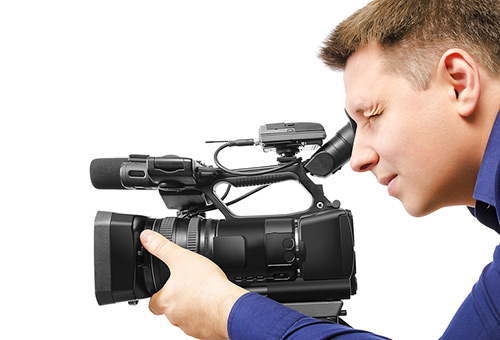The Role of Legal Videography in Depositions and Tests
Legal videography has actually emerged as an essential device in both depositions and trials, supplying a multifaceted technique to documenting witness testimonies. As legal specialists increasingly identify its value, it motivates a deeper assessment of just how these visual documents can influence juror understandings and test outcomes.

Value of Lawful Videography
Legal videography plays a crucial role in the paperwork and discussion of depositions and trials. This specific area incorporates technical skills with lawful knowledge to produce a reliable record of procedures that can significantly influence situation end results. The appearance of legal videography boosts the understanding of witness testament, allowing jurors and judges to observe not only the talked words yet also the temperament, emotions, and body language of the witnesses.
Furthermore, lawful videography gives an unbiased account of occasions, minimizing the potential for misconception that can accompany composed transcripts alone. This visual paperwork acts as an important device during trial presentations, facilitating a clearer and even more influential story for both complainants and accuseds. Moreover, the capability to replay video sections during court process makes it possible for lawful teams to highlight bottom lines, strengthening their arguments effectively.
The value of legal videography extends past the court; it also plays an essential duty in protecting evidence for future referral, whether for charms or further lawsuit. Its combination into the legal procedure is crucial for making sure a fair and precise depiction of the facts, ultimately contributing to the pursuit of justice.

Refine of Legal Videography
While catching the nuances of depositions and tests, the process of legal videography involves numerous essential actions that make sure top notch, accurate recordings. At first, a professional lawful videographer prepares by assessing the case materials and recognizing the particular requirements of the deposition or test. This preparation includes acquainting themselves with the participants and the context, which helps in recording pertinent details.
On the day of the recording, the videographer establishes up the needed tools, which commonly consists of high-def electronic cameras, microphones, and correct lighting. Making sure ideal angles and sound quality is important, as it directly impacts the effectiveness of the recording. The videographer communicates with lawyers and individuals to develop procedures, guaranteeing that everybody comprehends the recording process.
During the deposition or trial, the videographer thoroughly tapes the procedures, paying close interest to both verbal and non-verbal hints. This consists of recording the disposition and reactions of witnesses and attorneys. After the session concludes, the videographer might modify the video footage for clearness and compliance with legal standards, creating a final item that properly shows the proceedings for future reference and usage in lawful contexts.
Advantages in Depositions
The unification of videography in depositions uses various advantages that boost the general process of collecting evidence. One main benefit is the capacity to capture witness testimonies with aesthetic and auditory integrity, supplying a much more exact depiction of the witness's disposition, tone, and body language. This multidimensional approach permits attorneys and courts to examine reputation a lot more efficiently than conventional written transcripts alone.
In addition, videographed depositions function as an effective tool for protecting testament. Ought to a witness come to be not available for test, their recorded deposition can be played in court, making sure that their proof remains easily accessible and relevant. This element significantly minimizes the threat of losing vital information go to the website that might affect instance end results.

Lastly, videography enhances the total professionalism and reliability of the deposition procedure, instilling self-confidence in clients relating to the thoroughness of their lawful depiction (legal videography). By leveraging technology, legal experts can dramatically improve the efficiency of depositions
Impact on Trials
In lots of trials, the assimilation of videography can significantly affect the presentation of proof and the court's assumption. Lawful videography records witness statements and vital proof in a dynamic style, allowing jurors to involve hop over to here with the product on multiple levels. This visual component boosts the storytelling aspect of a test, giving context and psychological vibration that traditional text-based evidence may lack.
In addition, video recordings can act as powerful devices for impeachment during interrogation. When discrepancies develop between a witness's prior declarations and their courtroom testimony, video clip proof provides an objective referral that can persuade jurors' opinions. This immediacy and quality can reinforce the integrity of a party's story while at the same time threatening opposing disagreements.

Future Trends in Legal Videography
As we look toward the future of legal videography, several emerging patterns guarantee to improve its duty within the court room. One considerable pattern is the assimilation of expert system (AI) in video analysis and modifying. AI can enhance the procedure of recognizing key moments in tape-recorded depositions, enabling attorneys to swiftly access appropriate web content, thereby enhancing effectiveness in situation preparation.
Furthermore, the increase of online fact (VIRTUAL REALITY) and augmented reality (AR) innovations is expected to change exactly how jurors experience evidence. legal videography. By immersing jurors in a simulated setting, these modern technologies can supply a more profound understanding of complex situations, causing even more informed considerations
Furthermore, the boosting demand for remote depositions, increased by the COVID-19 pandemic, will likely continue. Legal videographers will certainly need to adjust to new software and systems to guarantee top quality recordings in virtual setups.
Lastly, the expanding emphasis on information safety will require stricter methods for storing and sharing video clip evidence. As the lawful landscape develops, lawful videographers should remain abreast of these patterns to keep browse around this web-site their significance and effectiveness in the judicial procedure.
Conclusion
In recap, legal videography serves a crucial feature in the judicial process, boosting the honesty of depositions and tests. As technology continues to evolve, lawful videography is positioned to further transform its function within the legal landscape.